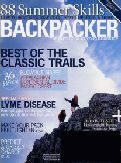

| Home | ||||
| Articles | ||||
| Books | ||||
| Resume | ||||
| Contact | ||||
| Blog | ||||
|
||||
|
Man's death from Creutzfeldt-Jakob disease poses questions In life, Gary Padgham was an outdoorsman, a popular guide who made his living finding trout in the rivers of Montana. In death he has become part of a national medical mystery: What causes Creutzfeldt-Jakob disease? Tests are reportedly under way at the University of California at San Francisco to determine whether his death two weeks ago at a Monterey convalescent hospital was caused by the poorly understood brain disease, which is blamed for one in every 1 million deaths. While awaiting the results, family members in California and former co-worker Joan Watts in Montana are trying to piece together how Padgham, 50, acquired the always-fatal condition. Padgham's relatives have declined to speak on the record pending the outcome of the testing, but have told others that they believe Padgham may have become ill from eating deer or elk infected with chronic wasting disease in Montana. However, health officials say there is no scientific evidence that chronic wasting disease can be transmitted from deer or elk to humans. Padgham was a fishing guide and outfitter who lived in Bozeman, Mont., and occasionally ate wild game, said Watts. Before contracting the illness, Padgham had diabetes but was very active and fairly healthy, Watts said. She first noticed Padgham's symptoms last October when he started shaking and stumbling. "I thought he had Parkinson's," she said. The initial diagnosis was Huntington's disease. By early July, Watts said, Padgham had lost much of his motor control. He was airlifted to the University of Washington Medical Center in Seattle, where he was diagnosed with Creutzfeldt-Jakob. The day after she learned about Padgham's diagnosis, Watts read a news article about an ongoing investigation into the deaths of two Wisconsin hunters and a Minnesota hunter, all venison eaters who had died several years ago from degenerative brain diseases. It was then that she and others began suspecting that Padgham's illness might be linked to deer or elk, she said. Concerns about chronic wasting have led to the eradication of deer herds in Colorado and Wisconsin. First identified in 1967, chronic wasting disease has now shown up in 10 states, including Montana. Though the World Health Organization warns against eating any part of a deer with signs of the disease, medical researchers say there is no documented case of chronic wasting disease infecting a human. Jim Murphy, a health specialist with Montana's Department of Public Health and Human Services, said there is absolutely no evidence that chronic wasting disease has ever jumped to humans from deer or elk the way the related mad-cow disease crossed the species barrier in Europe. Part of the difficulty in trying to link Creutzfeldt-Jakob with anything a victim might have eaten is that the cases are so rare, Murphy said. Montana gets about one reported case every two years, he said. "It's hard to link up such rare events with a significant cause," he said. Murphy said 75 percent of Montana men hunt and many more eat wild game. He said it would be impossible to link Creutzfeldt-Jakob with chronic wasting disease unless there was an "exact match" genetically between the deer meat and affected human tissue. Referring to people afflicted with Creutzfeldt-Jakob, Murphy said "No doctor would have responsibly told them that they got it from (deer or elk)." In most Creutzfeldt-Jakob cases, the mode of transmission is never determined. Some patients with Creutzfeldt-Jakob have medical histories of corneal transplants or injections of growth hormones prepared from human pituitary glands. Other patients with the disease have had a history of brain surgery within two years of diagnosis. Health officials from Monterey County said they were aware of Padgham's case but were not investigating. "It's not an unusual age range that would catch our attention for further evaluation," said Dr. Alicia Paris-Pombo, an epidemiologist with the county Health Department. Victims are typically 35 years or older. Jennifer O'Brien, a spokesman for UC-San Francisco, said there is no evidence that Padgham suffered from chronic wasting disease. She would not comment on details of the current procedures. UCSF is one of the top research facilities for the study of Creutzfeldt-Jakob. The university's Dr. Stanley Prusiner won the Nobel Prize in 1997 for his research identifying a connection between abnormal proteins and neurodegenerative diseases such as mad cow disease, chronic wasting disease and Creutzfeldt-Jakob. Pathologists at UCSF regularly conduct autopsies of patients with the disease, a process that usually takes about two to three weeks, O'Brien said. She said researchers look at brain tissue to determine whether Creutzfeldt-Jakob occurred spontaneously or from another cause. Padgham led guided fishing expeditions for more than 15 years and worked as a freelance graphic designer during the winter months. Padgham was featured in a TV commercial for Ford Explorer that still runs on many sports stations. He was a 1969 graduate of Carmel High School who was an avid steelhead fisherman before moving to Montana in 1982.
|


